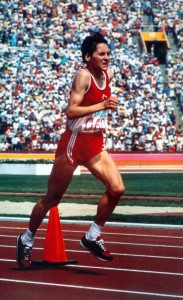Looking back 30 years to the first women’s Olympic marathon


Before 1984, women had never been allowed to compete at the Olympics in the marathon. On Aug. 5 of that year, for the first time ever, a group of women set off at 8 a.m. under the gruelling summer heat of Los Angeles to race 42.2K on the world’s largest stage.
This week, it’s been 30 years since that iconic first women’s Olympic marathon, won in an impressive show of front-running by American Joan Benoit Samuelson. Silvia Ruegger represented Canada at those Games, finishing eighth in a new Canadian record.
“I remember being incredibly grateful for the privilege that the opportunity had opened up in my time and I actually had the opportunity to run,” says Ruegger about her experience at the Games.
“I remember my dream as a young teenager was to be an Olympian, but I didn’t even envision the marathon because it wasn’t an event. So I was grateful to be able to participate in that first ever, very historic race and have the walls come down and the doors of opportunity open at the right time for me. I was so grateful for that. And I think just to be on the starting line with pioneers in the sport that I as a young athlete has read about.”
Ruegger bettered her own record six months later in Houston and her time of 2:28:36 stood for 28 years until it was broken by two women, Lanni Marchant and Krista DuChene, in a single race last fall.
Only two weeks after her record in Houston, Ruegger was in a serious car accident that removed her from the sport for two years and, although she was able to return to competitive training, the remainder of her career was plagued with injuries.
In 1984 it wasn’t as acceptable to see women compete in exhausting events such as the marathon, and today at some high-level events women still run different race distances than men, but the swell of women competing at all levels of sport has largely shifted. On road race start lines today women outnumber men in all distances except the marathon, and they will likely overtake men’s numbers soon there as well.
For Ruegger, to see two Canadian women run faster than her record in a single race, it signifies to other young Canadians that it’s a goal they can look towards. It shows that it can be done and she wasn’t the only one capable of doing it.
“I think a lot of that is just being able to see what is possible,” says Ruegger. “After ’84 we saw a very rapid change. When you talk to people now and say that 1984 was the first year women ran the marathon at the Olympics they’re shocked.”


